|
A Golden Revival
I find it
difficult to believe in the current craze for re-publishing everything ever
written in the so-called ‘Golden Age’, down to and including Agatha Christie’s
notes to the milkman, the works of a true genius are only now being
re-discovered and re-issued.

Camera
Obscuring is
probably the best-known title by Evadne Childe (1890-1965), a ‘Golden Age’
contemporary of Christie, Allingham, Sayers and Marsh, who introduced her
archaeologist sleuth Rex Troughton in 1933 and who made his last appearance in
1963. All her novels were, remarkably, produced by the same publisher, Gilpin
& Co. of London and New York.
Although a
relatively late addition to the cannon, in 1952, Camera Obscuring
was a bestseller on both sides of the Atlantic and was filmed in Hollywood,
though the London setting was changed to America, starring Richard Widmark and
Sterling Hayden. It is the first Evadne Childe novel to be re-issued, by
Buckhalter & Byng this month, using the famous cover art of the original
jacket designer known as Flik, and it is astonishing to realise the book –
about a cunningly orchestrated robbery of a mail van – has been out of print
for more than fifty years. Other titles are promised, including Right
Body, Wrong Grave (1937), Dark Moon Over Soho (1945) and The
Robbers Are Coming To Town (1951).

Little is
known about the private life of Evadne Childe, the daughter of an Essex vicar,
who was briefly married to the archaeologist Edmund Walker-Pyne, one of the
first British casualties of WWII in 1939. For many years she was a near
neighbour, in rural Essex, of both Dorothy L. Sayers and Margery Allingham, who
was said to have listed her as ‘Albert Campion’s favourite writer of detective
stories’. [See Books of the Month]
Plague Years
Great
fears of the Sickness here in the City, wrote Samuel Pepys in his diary on 30th
April 1665, but before the Corona virus tightened its grip, a hardened cohort
of crime fiction reviewers met with the publicity team from Headline for
informal drinks, chat and gossip in a famous London hostelry. It turned out to
be one of the last events on the crime fiction social calendar before the
quarantine descended.
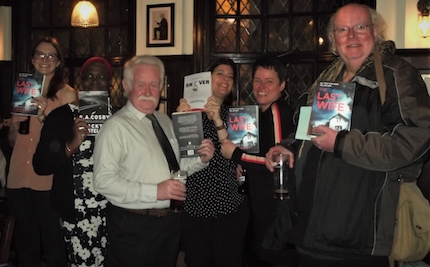
Without
recourse to speeches, PowerPoint presentations or author readings (or even
authors), the enthusiastic publicists enthused the gathered hacks about their
forthcoming crime titles from contemporary psychological/domestic suspense such
as Karen Hamilton’s The Last Wife (in June), to the traditional
‘village mystery’ of Ann Granger’s A Matter of Murder (July) to exotic
locations such as Barbara Nadel back on an Istanbul beat with Blood
Business (in May), to the latest WWII thriller by Simon Scarrow Blackout
(August) and established bestseller Martina Coles’ Loyalty in
October.
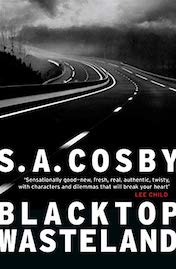
And one
unfamiliar name which I am now looking forward to very much: S.A. Cosby. I have
no idea of Mr Cosby’s first names but his novel Blacktop Wasteland,
which is published in August, comes with terrific advance notices from Lee
Child, Dennis Lehane, Walter Mosley and Steve Cavanagh, so I for one intend to
take it seriously.
Another
new American name to watch out for is Stephen Spotswood, whose Fortune
Favours The Dead is published under Headline’s Wildfire imprint in
October. Set in New York in 1946 and starring a female private eye duo, this is
said to be a take on a ‘Golden Age’ locked-room mystery but owing more to
Chandler than Christie.
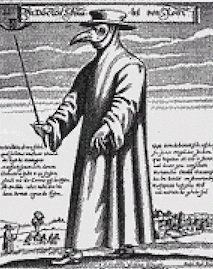
For legal
reasons I would not have attended the inaugural Lyme Crime festival which was
scheduled to take place in June in that fine coastal resort of Lyme Regis, one
of my favourite seaside destinations which is also home to one of my favourite
second-hand bookshops.
I wished
it every success, especially as I only found out about it just as the news
reached me that crime fiction conventions in Bristol (Crimefest),
Belfast (Noireland), in Maryland (Malice Domestic), Chicago (Murder
& Mayhem), in Florida (Sleuthfest) and San Diego (Left Coast
Crime) have all been postponed due to fears of spreading the Corona virus.
It is
also sad to report that the Dorothy L. Sayers annual lecture at Witham in
Essex, this year to be given by no less than Professor Barry Forshaw has been cancelled.
Barry’s lecture was to have been something like the 23rd or 24th
in the series; the inaugural lecture being given by P.D. James, the second by
me and the third by Minette Walters. Another event regularly in my diary is the
annual birthday lunch for Margery Allingham, held in May by the Margery
Allingham Society. I was particularly looking forward to this year’s party as
the guest speaker was to have been that erudite cosmopolitan Mr Peter
Guttridge, and I was so looking forward to introducing him.
I have to
admit that I have personally succumbed to the craze for panic buying created by
the plague scare and have shamelessly stock-piled large quantities of Sicilian
Vermentino and as much Amarone as I could find. Suddenly self-isolation,
considering all the books I have to read, doesn’t seem too bad.
Memory Lane
I was
recently asked how long I had been ‘doing that bloody column’ by which I
presume they meant Getting Away With Murder. Always being one to help the
police students of the genre in their researches, I delved into the
archives and discovered that it must be twenty years or more since this column
first appeared in the pages of the late, lamented Sherlock magazine. GAWM,
as it affectionately came to be known (‘GAWM-less’ in Yorkshire) moved to the
newly electronic version of Shots magazine in 2006 and appeared
sporadically until 2010 when, for reasons which totally escape me now, it was
decided to go monthly.
Looking
back to that first column of the New Era of eZines rather than magazines
(though the column survived until this month in print form, syndicated in the
American magazine Deadly Pleasures), I was surprised to find that even
back then I was having reservations about certain aspects of the work of a well-known
author: James Lee Burke.
Am I the only
long-time fan (over 18 years now) who is finding (Dave) Robicheaux’s
sanctimonious and arrogant approach starting to grate? Is it his insistence
that crime is usually a result of genetic defects or alcohol addiction, his
lip-service Catholicism, or his bullying tactics which would by now have got
him dismissed from the police force, even in Louisiana (or at least his ass
would have been sued off)? In his latest outing, he over-reacts so hugely to a
man he suspects of trying to poison his pet three-legged raccoon (sad or what?)
that you begin to fear that someone so unstable should be walking around with a
badge and a gun. Especially the gun.
Is Dave
Robicheaux becoming the Grumpy Old Man of crime fiction? Or is it me?
It was also rather spooky to discover that in that column, back in 2006,
I featured another American, Walter Satterthwait, who featured briefly in last
month’s column following his untimely death at the age of 73.
From his name
alone, you might think Walter Satterthwait was a bluff, nineteenth-century
northern brewer. In fact, he’s American and one of those rare breed of
Americans who (a) have a passport and (b) have used it, as he has lived in
Africa, Greece and the UK, as well as Santa Fe and, currently, Los Angeles. He
is known for two distinct types of crime novels. His excellent private eye
books featuring Santa Fe based Joshua Croft, and then his tongue-in-cheek
period mysteries, most famously Miss Lizzie
(starring Lizzie ‘The Axe’ Borden), the quite brilliant Wilde West
(starring Oscar Wilde and a very suspect Doc Holliday) and the 1920s series
featuring Pinkerton agent Ned Beaumont with a supporting cast ranging from
Harry Houdini and Arthur Conan Doyle to Ernest Hemingway and a young Adolf
Hitler.
Now he adds a
third-string to his bow, with the serial-killer thriller Perfection,
just out in the US from Thomas Dunne Books (St Martin’s Press). Walter being
Walter, he can’t resist stirring it and he has a serial killer who only preys
on “ladies of size” which probably hasn’t gone down too well in some parts of
the US.
Although
championed by editor Elizabeth Walter at Collins Crime Club in the late ‘80s
and early ‘90s, Satterthwait has been disgracefully blindsided by UK publishers
for about ten years now, although he is incredibly popular in Germany. (Well,
up to the Hitler book, anyway.)
Early in his
writing career he even had a biography written by an ardent fan, Sleight
Of Hand, published in a limited edition by the University
of New Mexico Press in 1993. My copy carries the dedication “This is bound
to become extremely valuable. Very few copies were printed, fewer were
distributed, and none were sold.” Which sort of shows that the experience
didn’t go to his head.
Walter’s sad, though not unexpected, death has provoked a host of
tributes and memories including one which recalls the story of how he awarded
himself the title International Lunch Whore. The ‘International’ bit came from
his frequent trips to Europe to meet his European publishers, not as here,
where he was ‘off duty’ in London with his then wife Caroline, being shown the
important tourist sights (the inside of a tavern) by Sarah Caudwell and myself.
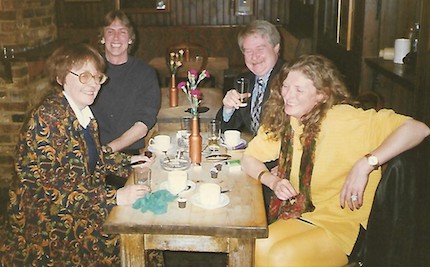
On one
European tour he famously diverted to Paris for a free lunch with his French
publisher and then took a train to Milan for a free lunch with his Italian
publisher. He later admitted that travel and hotels costs for that diversion
had been $1,275, but as he said philosophically, “when it comes to free
lunches, money is no object”.
Film Fun
I was
distracted, nay furious, to hear a rumour that Sam Peckinpah’s 1969 western The
Wild Bunch was being re-made by Mel Gibson. Why? Wasn’t the remake of The
Magnificent Seven travesty enough?
Whilst
trying to research this awful news, I came across several other titbits of
filmic fun. Something called Netflix has produced Spenser Confidential,
which I am told is “loosely based” on the books of Robert B. Parker and
latterly Ace Atkins, featuring the highly-regarded Boston private eye. From
what I have seen, “loosely” is certainly the word. (Ed: See what Mark Timlin thinks of it.)
I am more
hopeful about the filming of Jim Thompson’s 1964 gritty thriller Pop.1280
with its famously cynical opening monologue by a small town sheriff who ‘has it
made’ basically by doing as little as possible to fight crime.

Anything
by Jim Thompson, a master of American noir, is worth reading and film
adaptations rarely less than interesting. I have, shamefully, never seen the 1981
French film Coup de Torchon, which was based on Pop.1280,
but I have heard very good things about it.
Also
rumoured to be in the pipeline is In the Garden of The Beasts,
set in pre-war Nazi Germany and starring Tom Hanks, a high-profile victim of
the Corona virus. This turns out to be based on the book by Erik Larson and
not, as I first thought, the 2004 thriller by Jeffery Deaver with a similar
title.
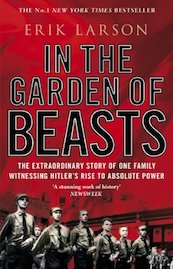 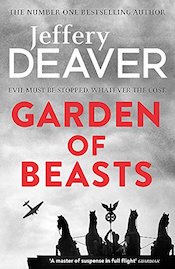
Another
reason for my confusion was that I remembered the late Philip Kerr once telling
me over lunch of Tom Hanks’ interest in the period and his Bernie Gunther books
in particular, and there was speculation about a possible television
adaptation. What became of that suggestion I do not know, but I am aware that
Philip, in a review for the Washington Post in 2011, really rated Erik
Larson’s work of popular history, as apparently did Tom Hanks, saying that it
read like ‘an elegant thriller’. If it impressed Philip, then I will find a
copy (I already have) and read it almost immediately.
Best Served Cold
I was
reading up on Jacobean ‘revenge tragedies’ (as you do) recently and came across
an interesting introductory essay by the late Professor Gamini Salgado which
discusses the pitfalls of putting dramatists and their plays into particular
genres or sub-genres such as ‘the Revenge Play’. Professor Salgado, although
Sri Lankan by birth, displays the manners of a perfect Englishman when he
wrote, in 1965:
Literary
categories are always arbitrary and creative artists have always shown a
healthy disrespect for them (if, indeed, they have been aware of their
existence). Everyone knows that there is a class of fiction called the
thriller; it is perhaps the most popular form of fiction in our day. It has certain
broad characteristics, detection, mystery, suspense, and so on, and its
practitioners range from Mr Mickey Spillane to Mr Graham Greene.
The
Professor made a good point, though I just wondered how often Mr Spillane has
been referenced in a book which deals in the main with fellow thriller writers
such as Shakespeare, Marlowe, Kyd, Webster and Middleton.
Famous Names
Late last
year I was contacted by an American reader, one with impeccable taste in
hardboiled crime fiction, asking if I had read Neil Clark’s biography of Edgar
Wallace, Stranger Than Fiction, saying that he understood no-one
read Wallace any more in England and added (very worryingly) ‘like John D.
Macdonald here in the US.’
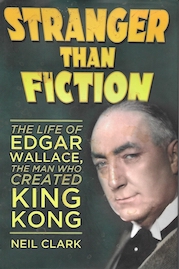
I do hope
he is wrong about John D. Macdonald, though I can understand why Wallace has
fallen from memory, despite having an impressive London pub named after him and
being often touted as ‘the man who created King Kong’ – although
devotees of the original movie have long argued about his contribution.
There is
no doubt, though, that Wallace (1875-1933) was a huge influence on the crime
and thriller fiction scene, writing around 170 books and accumulating worldwide
sales of an estimated 200 million copies, starting with his legendary debut The
Four Just Men. He was also, for many years, the king of the horse racing
thriller decades before Dick Francis made that sub-genre his own, and much more
heavily involved than I realised in the world of the theatre.
I wish I
could say that Stranger Than Fiction made me rush to read an
Edgar Wallace novel or two (or twenty) but I’m afraid it did not. There is
surprisingly little analysis of Wallace’s thrillers (and their popularity) as
the book concentrates more on his early life as a journalist and his
involvement in the theatre and there are constant, and I do mean constant,
references to how profligate he was with his money but how ‘generous he was to
others’ (the milkman he owed £70 to in 1905 might disagree). But I would
caution any potential reader not to skip the first half of the book otherwise
they will miss the chapter where it is explained that Edgar and his second wife
Violet decided on the pet-names of Richard and Jim for each other. Without this
forewarning, the second half of the book could strike the unwary as slightly
odd as Edgar, having divorced his wife Ivy in 1919, is suddenly in partnership
with a Jim.
I am not
sure what Dorothy L. Sayers thought of the work of Edgar Wallace; probably not
very much. Her main stint as a reviewer of crime fiction came after Wallace’s
death, but as a writer, she would have been establishing her career in the
1920s when Wallace was at the peak of his popularity.
|
|
Catalogue of Crime
I am indebted to the very impressive catalogue of forthcoming books for the second half of the year from publisher Head of Zeus for reminding me of two crime writers I realised I had not read for, disgracefully, almost a decade.
I met the charming Brian Freeman in London when he was first published in the UK and rated highly his thrillers set in chilly Minnesota starting with Immoral in 2005. Now he has, I suspect, fulfilled a teenage fantasy (as an admitted fan of the originals) by taking on Robert Ludlum’s Jason Bourne franchise with The Bourne Evolution which is scheduled for publication in July.
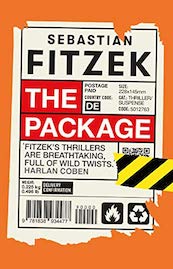
Sebastian Fitzek made headlines across Europe in 2006 when his debut psychological thriller Therapy knocked The Da Vinci Code off the top of the bestseller list in Germany. It did very well when published here in the UK in 2008 and I was surprised it was not a contender for the Crime Writers’ Association’s International Dagger, but I was determined to keep an eye out for his future titles. Of course I failed miserably in my vow to do so, but am delighted to see that Head of Zeus are to publish The Package in August along with Passenger 23 in November, neither of which, I believe, have appeared in English before, although both were highly successful in Europe.
Enough Bush To See You Through

Those enterprising chaps and chapesses at Dean Street Press are making sure that fans of the detective stories of Christopher Bush (1885-1973) will have plenty to read in the coming months of self-isolation, by republishing, next month, a further ten titlesto join the 40 Bush titles they have already revived. In terms of the adventures of Bush’s series detective Ludovic Travers, these represent books 41-50.
The new titles are The Cases of (respectively): The Counterfeit Colonel, The Burnt Bohemian, The Silken Petticoat, The Red Brunette, The Three Lost Letters, The Benevolent Bookie, The Amateur Actor, The Extra Man, The Flowery Corpse and The Russian Cross. Detection Club member Christopher Bush’s speciality was the ‘Unbreakable Alibi’, and his work drew praise from countless contemporaries for his tight plotting, urbane style and imaginatively varied mysteries. Dedicated fans not surfeited on those existing 50 titles will be eagerly anticipating the remaining 14 still to be republished.
Books of the Month
Though I
did recommend it earlier in the year, the late Philip Kerr’s 2005 thriller Hitler’s
Peace, now at last published here (Quercus) will be for many readers
their automatic book of the month, if not their year.

I hope
people will read it not just to remind them of what a story-telling talent we
have lost, but because it is actually a fast-paced and audaciously speculative
historical thriller and the Quercus edition comes with a heartfelt afterward by Howard Jacobson, who spoke so eloquently about Philip at the launch of his posthumous novel Metropolis.
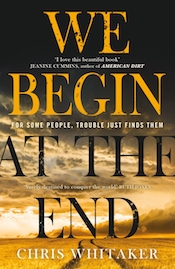
I am not
at all surprised that Chris Whitaker is widely regarded as one of crime
fiction’s rising stars, but I am astonished to discover he is British, so
convincing is the small town American setting of We Begin At The End,
out now from Zaffre.
At times
it reminded me of To Kill A Mockingbird, but that probably has more to
do with the fact that a character surname is Radley (and my specialist subject
on Pointless might just be the early films of Robert Duvall), and my
overwhelming impression was that this was a first rate American crime
novel. Its focus is a pair of siblings, the central character being a
13-year-old girl who becomes the mother and protector of her younger brother
after a series of very unfortunate events indeed. This book is so American, the
reader firmly believes that the best way to cure a thirteen-year-old girl
suffering severe emotional trauma is, of course, to teach her to shoot a
handgun.
We
Begin At The End has a convoluted plot covering guilt and innocence, small
town mores, dysfunctional families and an outrageous property scam and is, in
the main, thoroughly convincing. There are just one or two places, deep into
the book, where the young protagonist, who has led a sheltered life both
socially and educationally, comes out with opinions which seem far too advanced
for her age. Still, there is much here to engross the crime fiction fan and, in
the skill of the writing, an awful lot to admire.
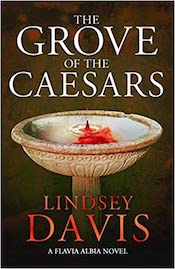
For a
totally exhilarating romp through Ancient Rome, Lindsey Davis’ latest Flavia
Alba novel won’t be beaten and offers an immersive experience of a vibrant
world full of real, recognisable characters.
The
Grove of the Caesars, out this month from Hodder, sees our intrepid female
investigator Flavia Alba venturing across the Tiber to the
gardens bequeathed by Julius Caesar to the people of Rome, later to be taken
over by the Emperor Augustus (because ‘he interfered in everything’) and now,
some 140-odd years after Julius’ all-got-it-infamy moment, the site of a
discovery of some ancient scrolls seemingly containing ‘lost’ philosophical
writings. Are the scrolls fakes? Is even their supposed author a fake? (Who
would think of creating a fake author, even on April 1st?)
The joy
of The Grove of the Caesars, as with all Lindsey’s Roman novels,
comes not so much in the plotting nor even in the fine detail of life in Rome
in the second half of the first century, but in the way her characters
deal with that life. They are treated to respectable music (‘everyone keeps
their clothes on and listens’), they have to sit through a display of proper
Greek dancing (‘the utterly boring kind’), they debate whether The Stargazer is
‘the lousiest bar on the Aventine’ when in fact everyone knows The Winged Pig
is (its food started an epidemic), and there is a priceless exchange when the
unearthed scrolls are dismissed as ‘garbage’: Who writes garbage – Most
authors; But who reads garbage? – The bloody public!
Lovely
stuff, worth every denarii.
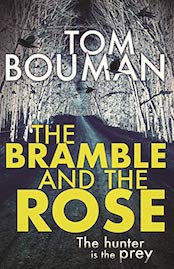
For a
very impressive slice of rural American crime-writing, I can highly recommend The Bramble and the Rose by Tom Bouman, from Faber. Set in the small town
(and big woods) of the wonderfully-named Wild Thyme in Pennsylvania, local cop
Henry Farrell is called upon to investigate a headless body found in the woods.
There are clear and dangerous signs that a bear attack was the cause and,
indeed, a bear, for whom the story does not end happily, is involved. Yet as
the identity of the victim emerges, the plot extends into a criminal conspiracy
which eventually encompasses Farrell’s friends and extended family.
Henry
Farrell is a flawed hero, at times cold and distant when it comes to personal
relations and alternately irrational with anger when his young nephew is
threatened. This being the American ‘wild’ there are lots of details about
tracking and camping out and also about guns, which are often referred to just
by the calibre of bullets they take, but this is a very finely written book,
often quite elegiac and for all his faults, Farrell is a worthy hero and one
worth keeping an eye on.
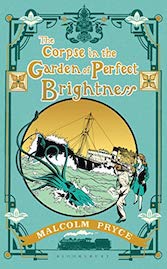
Now read this
very carefully for I will type it only once. The title of Malcolm Pryce’s new
novel is The Corpse in the Garden of Perfect Brightness (out now
from Bloomsbury), which vies in length with his The Unbearable Lightness
of Being in Aberystwyth, a fine example of his earlier work in the
field of surreal and hysterically funny Welsh noir – a field he distinctly made
his own.
In Corpse… Pryce’s
humour turns from Wales and all things Welsh, on to steam train buffs (with
some fondness) and the British Empire (with less affection), with lots of movie
references along the way, particularly King Kong. It is a gentle fantasy
adventure in which railway detective Jack Wenlock travels east of Suez to trace
the mother he never knew. As the year is 1948 and the Great Western Railway has
been nationalised into British Rail, a railway detective has probably got time
on his hands, even if he is pursued by a criminal international organisation
(but that’s another story).
Surprisingly,
or perhaps not, Pryce found more satirical targets among the Welsh rather the
in the far flung Empire, although there is one wonderful story about the
Japanese attack on Singapore in 1942 and the positioning of British artillery
on the edge of a golf course, which I totally believe. There’s also a starring
role for a giant squid, the great white whale to a Captain Ahab figure known as
Squideye, which adds to the craziness – and there is a lot of crazy in the
book.
But then,
whenever the setting is Thailand and there are railways and engines going chuff
chuff I always automatically think: ‘Madness…madness…’
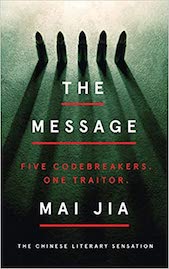
Devotees
of spy fiction looking for something new, even if the synopsis of five spies,
one of them a traitor sounds a tad like Tinker Tailor, should look no
further than The Message by Mai Jia (Head of Zeus), who may be
China’s John Le Carré.
Mai Jia’s
latest novel (he is a huge bestseller in China) is set in 1941 when the country’s
defence against Japanese aggression was split between the Nationalist forces of
Chiang Kai-shek and the Communist Party of Mao Zedong. In Hangzhou, the
Japanese puppet government isolates five code-breakers, two of them women, not
to combat the activities of the resistance armies, but to discover which one of
them has been passing information to the communists.
The
result is a fascinating play on history, loyalty, logic and coded puzzles and
the setting, and point of view, will certainly be unusual to European readers.
For those not familiar with the history of the period, there are copious notes
and explanations within the text, which in other contexts could slow or distort
the narrative, but here are invaluable.
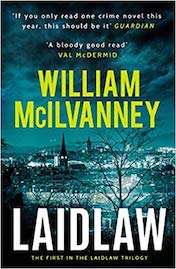
Not new,
in fact the book was first published in 1977 and my paperback edition is now exactly
thirty years old, but Laidlaw by William McIlvanney is a book of
the month every month. Especially so this month as a new edition appears from those
classy publishers Canongate.
If you’ve
heard the expression ‘Tartan Noir’ and wondered what it meant, this is where it
all started. A stone classic.
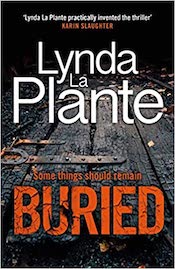
Can one
possibly say anything new about Lynda La Plante, the creator of Widows and
the iconic Jane Tennyson in Prime Suspect?
Of course
one can, for this month she launches new, contemporary crime series with a new
leading character, Met detective DC Jack Warr, in her new novel Buried,
from Zaffre. Jack Warr’s first case begins with a fire in a derelict cottage –
and if you’ve ever heard the expression ‘long pig’ and wondered what it meant;
all is explained. It seems a rough introduction for Jack Warr, recently arrived
in the big city from Devon (where he supports Plymouth Argyle, though that
shouldn’t be held against him) with his partner. Will he survive the drastic
change from rural to urban policing? You bet he will. Will we see him on a
screen somewhere soon? Don’t bet against it. This author has form in such
matters.
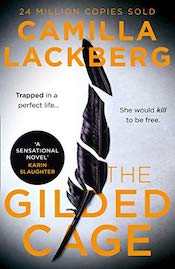 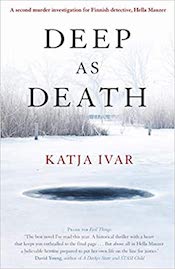
It was
the French medievalist Jean Gimpel who pointed out (at least to me) that the
Viking invasions of the early eleventh century were the last invasions suffered
by Western Europe. From then on, it was Western Europe which did the invading,
across the world, with varying degrees of success.
Gimpel,
of course, could not have foreseen the invasion of Scandinavian crime fiction in
the twenty-first century and few (pace Professor Forshaw) thought it
would last as long as it has, or throw up as many firm favourites, such as
Camilla Lackberg, who is said to be the sixth most-read author in Europe now,
as well as a runner-up in Sweden’s Strictly Come Dancing.
The
Gilded Cage, published this month by HarperCollins, has already been a
#1 bestseller in all Scandinavian countries and high in the charts in Germany,
France, Italy, Portugal and probably all the countries where it has been published:
a successful invasion indeed. Several years ago, an ambitious young journalist named
Boris Johnson wrote a very good article attempting to explain the appeal of
Scandi-crime. I remember keeping a copy and must try and dig it out.
And just
when this old and embittered hack thought there could be nothing new coming out
of the frozen northlands, I discover the adventures of Hella Mauzer, a splendid
creation by Finnish author Katja Ivar. Deep As Death, from Bitter
Lemon Press, really is very, very good. The setting is Finland in 1953, a cold
winter during a Cold War, and call-girls are ending up in Helsinki (‘a city for
walking fast’) harbour. It ends up as a case for Hella Mauzer, a former cop
turned private eye whose struggles against patronising, institutional sexism
form a vital plot strand.
Mauzer is
an engaging protagonist, the 1950’s setting and characters totally convincing
and Katja Ivar, I think, writes in English and does so wonderfully.
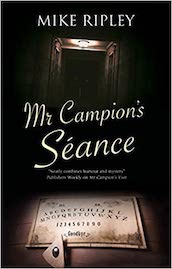
I cannot
resist mentioning Mr Campion’s Séance, published at the end of
this month by Severn House, for it illustrates a point I made earlier about
Margery Allingham’s legendary hero Albert Campion and the Golden Age author
Evadne Childe.
The
connection between the two could not be more clear as the plot of Mr
Campion’s Séance revolves around the detective stories of Evadne
Childe, from 1946 to 1962, which seem to be able to predict, or provide
blueprints, for real crimes. Set primarily in seedy post-war London, the whacky
world of publishing and the far more respectable world of psychics and mediums,
Allingham afficionados will appreciate the appearance of three of Margery’s
favourite policemen – Oates, Yeo and Luke. Well, I hope they do.
Corona Latest

Some optimism still exists in our virus-ridden world. Regular readers of this column in Italy report that although the medical situation there is serious, they have not fallen foul of the draconian policies of well-known supermarkets to limit customers to three examples of every item purchased, which I am sure was never intended to apply to wine. In Italy, I am assured that wine, and indeed whisky, are in plentiful supply.
And in Cambridgeshire, I hear of a pub which, faced with closure to encourage ‘self-isolation’, is selling off its stock of cask-conditioned ale at £1 a pint. Naturally, I have no intention of telling you where the George & Dragon is.
Stay safe,
Stay Home,
Stay Away from Me,
The Ripster.
|